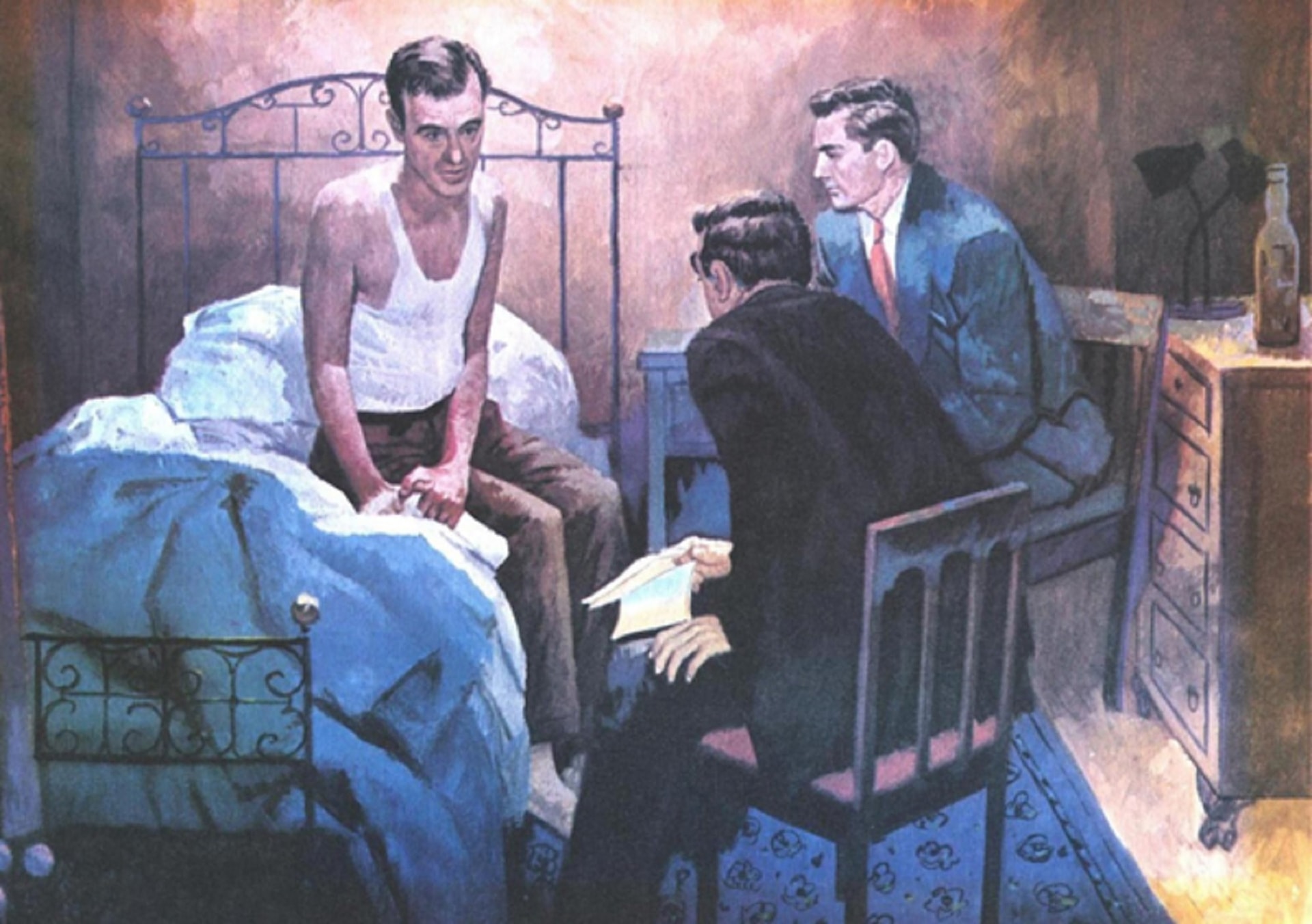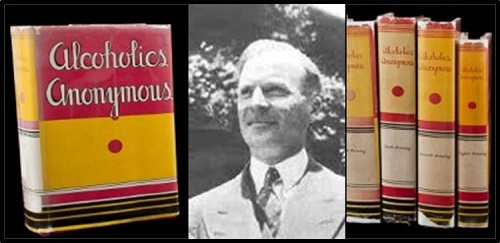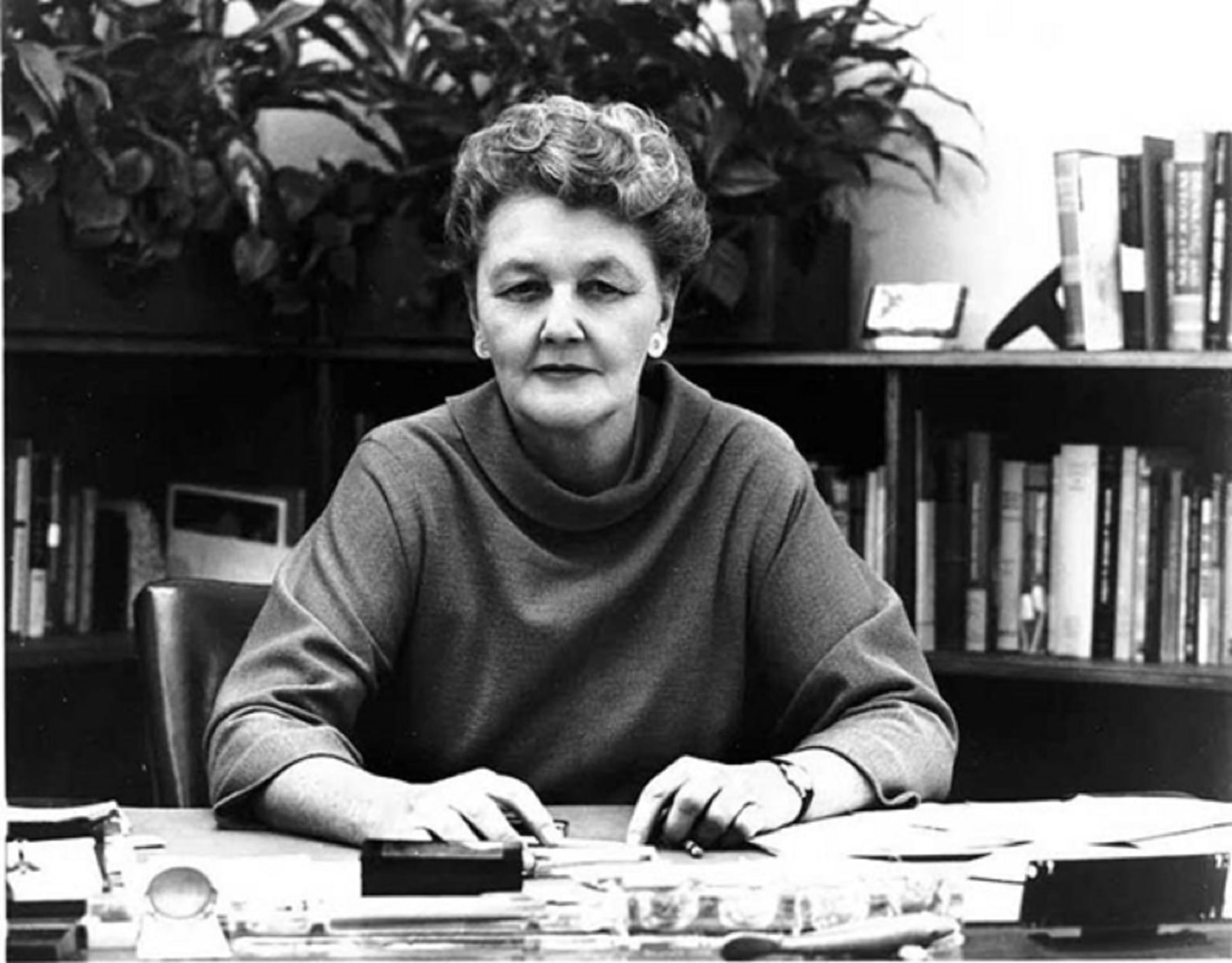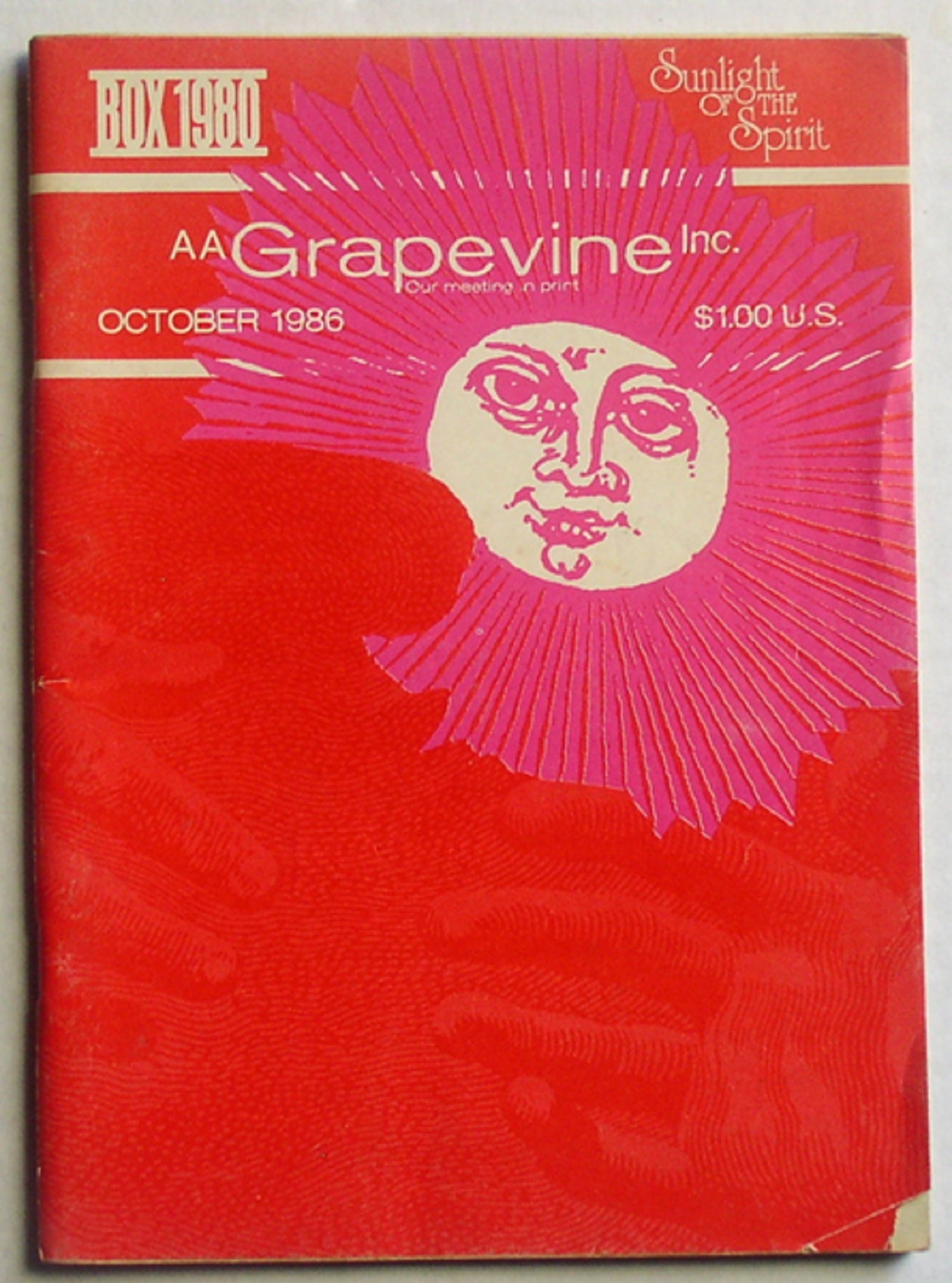Alcoholics Anonymous was spouted from the Oxford Group. The Oxford Group was an organization that became popular in both Europe and the United States in the early 20th Century. The Oxford Group was a non-secular organization and promoted religious and spiritual ideals amongst its members. This was long before the days of alcohol detox or alcohol rehab clinics were available to the public.

Above: Frank Buchman
The Oxford Group was founded by an American Christian missionary called Frank Buchman. Buckman promoted the idea of surrendering one's life over to God's plan. This idea is central to the 12-step program adopted by Alcoholics Anonymous.
"The world is anxiously waiting to see what Jesus Christ can do in, by, for, and through one man wholly given to him - God-led. You can be that man." — Frank Buchman, Oxford Group Founder.
An AA member explains the early history of AA in the video below:
In 1932, a prominent Rhode Islander, Rowland H, joined the Oxford group after being recommended to the group by well-known Swiss psychoanalyst Carl Jung. Rowland H sought out Jung’s help because Rowland H could not control his drinking.

Above: Rowland H. Right: Carl Jung
Jung concluded that Rowland’s alcoholism could not be cured until he experienced a spiritual awakening, also known as a ‘conversion’. This is why Jung directed Rowland to the Oxford Group.
Rowland eventually stopped drinking alcohol after reading the book "For Sinners Only" by A.J. Russel. This book tells of the Oxford Group Movement and of its human founder, Dr. F. N. D. Buchman.
"I am strongly convinced that the evil principle prevailing in this world, leads the unrecognized spiritual need into perdition, if it is not counteracted either by real religious insight or by the protective wall of human community. An ordinary man, not protected by an action from above and isolated in society cannot resist the power of evil, which is called very aptly the Devil. But the use of such words arouse as many mistakes that one can only keep aloof from them as much as possible. " — Carl Jung.
The Oxford Group required members to introduce new people into their ranks. For this reason, Rowland introduced Ebby Thacher (“Ebby T”) to the Oxford Group. Ebby T was, like Rowland, also able to stop drinking after practicing the principles prescribed by the Oxford Group.

Above: Ebby Thacher
Like Rowland, Thacher was also encouraged to recruit new members into the Oxford Group. Thacher knew an old drinking buddy who he believed would benefit from practicing the principles espoused by the Oxford Group. This man’s name was William Griffith Wilson (Bill W). At this time, Bill W lived at 182 Clinton Street in Brooklyn with his wife, Lois.
In November 1934 Bill W arranged to meet Thacher. Bill W was shocked to learn of Thacher's sobriety. Thacher refused to drink saying 'I've got religion'. Thacher told Bill W about the Oxford Group which met at Calvary Rescue Mission. Bill W was not receptive to Thacher's invitation to join the group.
Bill W was a chronic alcoholic. His education and career had both been blighted by his drinking. At this time, Bill W was approaching 40 years of age and he believed his alcoholism was irreversible. Bill W had been admitted to Towns Hospital on four occasions for his alcoholism in Manhattan. Despite this, Bill W continued to drink.
In December 1934, Bill W was admitted back to Towns hospital for alcoholism treatment.
Before this admission, Bill W had attended Oxford Group meetings at Calvary Rescue Mission under the guidance of Rev. Dr. Samuel Shoemaker.
The Group's guidance helped Bill W undergo a spiritual experience whilst in the care of Towns Hospital.

Above: Dr. Samuel Shoemaker
Bill W said this spiritual experience lifted his depression and allowed him to stop drinking alcohol. Bill W effectively underwent what was to become Steps Four, Five, Six, Seven, and Eight of the 12 Steps.
"Don't pray to escape trouble. Don't pray to be comfortable in your emotions. Pray to do the will of God in every situation. Nothing else is worth praying for." — Dr. Samuel Shoemaker, Oxford Group Leader.
Whilst at Towns Hospital, Bill W received care from Dr. William D. Silkworth. Silkworth believed that alcoholism was not a moral failing, but a mental obsession combined with an allergy.
Silkworth said this allergy made compulsive drinking inevitable. This meant that sobriety was the only option for those who experienced alcoholism.
 Above: William D Silkworth
Above: William D Silkworth
"We believe, and so suggested a few years ago, that the action of alcohol on these chronic alcoholics is a manifestation of an allergy; that the phenomenon of craving is limited to this class and never occurs in the average temperate drinker. These allergic types can never safely use alcohol in any form at all; and once having formed the habit and found they cannot break it, once having lost their self-confidence, their reliance upon things human, their problems pile up on them and become astonishingly difficult to solve." — Dr. William D. Silkworth, Doctor at Towns Hospital.
Bill W's spiritual experience may have been a side effect of his consumption of the drug Atropa belladonna along with the fluid extracts of xanthoxylum (prickly ash) and hyoscyamus (henbane). This is also known as the "Belladonna Cure".
Bill W was also likely to be experiencing symptoms of alcoholic delirium tremens.

This drug causes users to hallucinate. Bill W described seeing a bright light, accompanied by a feeling of ecstasy during his spiritual awakening.
With his new founded sobriety, Bill W went on a mission to also help other alcoholics.
In the below recording, Bill W talks about his spiritual experience:
"Is sobriety all that we are to expect of a spiritual awakening? No, sobriety is only a bare beginning; it is only the first gift of the first awakening. If more gifts are to be received, our awakening has to go on. As it does go on, we find that bit by bit we can discard the old life - the one that did not work - for a new life that can and does work under any conditions whatever." — Bill W, AA Co-Founder.
In January 1935, Bill W went on a business trip to Akron, Ohio. During this trip, Bill W was tempted to drink alcohol in the hotel’s bar.
To prevent this from happening, Bill W telephoned a local minister from his hotel, asking if the minister knew of any alcoholics he could talk to.
Bill W learned from Thacher that cravings could be controlled by conversing with somebody who also experienced cravings.
Norman Sheppard directed him to a local Oxford Group member named Henrietta Seiberling. Seiberling’s group has attempted to help a local alcoholic named Dr. Bob Smith (Dr. Bob) but without success.
Dr Bob was highly impressed with Bill W’s alcoholism knowledge. Bill W explain to Dr. Bob what he had learned from Dr. William D. Silkworth at Towns Hospital.
Bill W was impressed with Silkworth’s idea that alcoholism is a mental obsession and allergy that makes drinking inevitable.
Bill W shared that the only way he was able to stay sober was through having had a spiritual experience.
Dr. Bob was familiar with the tenets of the Oxford Group and upon hearing Bill W’s experience, began to pursue the spiritual remedy for his malady with a willingness that he had never before.

Above: Dr Bob S and Bill W
Bill W decided to temporarily move into Dr. Bob’s home in Akron. Dr. Bob lived with his wife, Anne. Dr. Bob returned to drinking after attending a medical convention in Atlantic City. Upon his return, Dr. Bob quickly returned to sobriety.

Above: Dr. Robert Smith's House in Akron
Whilst living at the Dr. Bob’s home in Akron, Bill W took part in the local Oxford Group’s practice of morning meditations and Bible readings.
Bill W stated that Dr. Bob was the first alcoholic he managed to bring to sobriety. Dr. Bob drank his last drink on June 10, 1935. This is why June 10 is considered the founding date of AA by its members. Dr. Bob remained sober from this date until he died in 1950 from colon cancer.
Bill W and Dr. Bob wanted to develop a system that was designed to specifically help those who suffered from alcoholism.
They believed the Oxford Group’s principles were, whilst helpful, too broad in scope. They wanted their new system to stress the fact that alcoholics were hopeless and powerless over their condition and that these people were in a state of insanity rather in a state of sin.
Bill W helped to formulate the principle that to remain sober, an alcoholic must reach out the help of other alcoholics.
The second principle that was conceived during this time was the 24-hour concept. This concept holds that if an alcoholic is able to delay the urge to drink by 24 hours, he or she will be able to delay this urge indefinitely.
"I can do something for 24 hours that would appall me if I had to keep it up for a LIFETIME." — Bill W, AA Co-Founder.
During 1935, Bill W and Dr. Bob met a man named Bill D in Akron City Hospital. Bill D was a lawyer and another ‘hopeless’ alcoholic.
During this visit, Bill D promised to never drink again. Bill D managed to uphold this promise for the rest of his life.
Bill D is credited as being the third member of what will become Alcoholics Anonymous. Bill D is also referred to as ‘the Man on the Bed’ after the now famous painting illustrated here.

Above: Bill D (Man on the bed)
Towards the end of 1935, Bill returned to New York to re-join his wife. Although Bill must return to work, his desire to help other alcoholics was burning lightly.
Bill W also gave speeches at the Oxford Group meeting at Calvary House. Bill W was dissatisfied with the results he was getting with the group.
Bill W went back to seek counsel from Dr. Silkworth. Dr. Silkworth advised Bill W to do less preaching and instead focus on educating the group about alcoholism as an illness.
Bill W began attending Towns Hospital in order to reach out to fellow alcoholics. He did not gel well with the Oxford Group folk in New York, so he instead turned to Dr. Silkworth for help.
Dr. Silkworth allowed Bill W to access his patients even though Silkworth was risking his medical career by doing so.
Here, Bill W met a man known as Hank P. Although Hank was an alcoholic, he was also a very bright and ambitious businessman. He had been an executive of Standard Oil but fired because of his alcoholism, and when Bill W met him, he was undergoing his tenth admission into Towns Hospital. Hank P joined Bill W’s mission to help other alcoholics.

Above: Hank P
There were many parallels between Hank P and Bill W, most notably because both were otherwise intelligent and healthy men whose careers had both been ruined by alcoholism.
Hank P formed Honor Dealers in New Jersey to compete against Standard Oil. The office of Honor Dealers became the first base for what would become known as Alcoholics Anonymous.
Both men focused all of the time in helping alcoholics rather than on the business. This meant they were unable to pay the rent on the building. They were eventually forced out by the landlord, forcing them to set up in a smaller building in Newark.
Back in Akron, Dr Bob started to run Oxford Group meetings for alcoholics. He names this the ‘alcoholic squadron of the Oxford Group’. In 1937, Dr. Bob continued these meetings at the home of T. Henry and Clarace Williams.
 Above: Inside T. Henry and Clarace Williams' home
Above: Inside T. Henry and Clarace Williams' home
In 1937, Bill W's efforts in working only with alcoholics were criticized by NY Oxford Group members. Similarly, in Akron, T Henry and Clarace Williams were criticized as well by Oxford Group members who were not supportive of their efforts being extended primarily to alcoholics.
In 1937, Frank Buchman and the Oxford Group experienced an international public relations disaster.
A NY World Telegram article by William H Birnie, quoted Buchman as saying, “I thank heaven for a man like Adolph Hitler, who built a front-line of defence against the anti-Christ of Communism.”

Above: Frank Buchman
Although the remark was taken out of context in its reporting, it would plague Buchman’s reputation for many years. It marked the beginning of the decline of the Oxford Group.
Late spring in 1937, leaders of the Oxford Group at the Calvary Mission ordered alcoholics staying there not to attend meetings at Clinton St.
Bill W and Lois were criticized by the Oxford Group members for having “drunks only” meetings at their home.
The Wilson’s were described as “not maximum” (an Oxford Group term for those believed to be lagging in their devotion to Oxford Group principles).
Aug, Bill and Lois stopped attending Oxford Group meetings. The NY AAs separated from the Oxford Group. The Oxford Group was re-named Moral Re-Armament in 1938.
In 1937, Bill W and Hank P attempted to raise money to fund their activities. They sought out funds by contacting every wealthy individual and charitable foundation in Manhattan.
However, their attempts proved unsuccessful. Eventually, the two were introduced to John D. Rockefeller, America's richest man. Bill W had a vision of setting up alcoholic hospitals and employing paid missionaries. They urged a donation of $50,000 ($650,000 today).
Rockefeller believed that money would ruin and corrupt the movement. Rockefeller granted the two a nominal amount of money to help ease their growing cash flow problems. $5,000 ($65,000 today) was granted.
This money was held in a fund in the Riverside Church treasury. Much of the fund was used to pay off Dr. Bob’s mortgage and provide Bill and Bob with $30 a week ($390 today).

Above: John D Rockefeller
In 1938, the Alcoholic Foundation was established. Dr. Bob was a trustee and Bill W sat on the advisory committee. The Foundation was set up to provide an organisational framework for their movement.

Above: Alcoholic Foundation
In 1938, a member of the Oxford Group in Akron, Clarence S, founded an offshoot of the Group that was only open to alcoholics and their family members.

Above: Clarence Snyder, Founder of AA in Cleveland.
The group adopts the name of the Big Book mimeographs – “Alcoholics Anonymous”. The first Alcoholics Anonymous meeting is held in May 1939 in the home of Abby G.
The Clevelanders still sent their most difficult cases to Dr. Bob in Akron for treatment. Clarence S hails himself as the founder of Alcoholics Anonymous.
We have included a recording given by Clarence S below:
"Yes, Cleveland's results were of the best. Their results were in fact so good, and A.A.'s membership elsewhere was so small, that many a Clevelander really thought A.A.'s membership had started there in the first place. The Cleveland pioneers had proved three essential things: the value of personal sponsorship; the worth of the A.A.'s Big Book in indoctrinating newcomers, and finally the tremendous fact that A.A., when the word really got around, could now soundly grow to great size." — Bill W, AA Co-Founder.
In 1938, Bill W began work on what would become known as The Big Book, formally titled Alcoholics Anonymous. Titles such as Haven, One Hundred Men, Comes the Dawn was also suggested.
The Alcoholic Foundation would receive a royalty on the sale of the book. Controversially, Bill W and Hank each retained a 33% share in the book.

They stated their royalties would have funded their work helping other alcoholics.
In the 1940s, details of the book's ownership came to light amongst the community. This caused outrage and Bill W accepted a new deal with the Alcoholic Foundation whereby he and Hank would surrender their shares to the Alcoholic Foundation.
The two had also sold shares in the book to a private investor. Fortunately, a loan from Rockefeller financed a buy-back of these shares.
In 1939, Bill W and Hank P parted ways. Hank P began drinking alcohol again. Hank resisted the call to turn over his shares relating to the Big Book to the Alcoholic Foundation but eventually agreed to do so. Hank claimed he was tricked into selling his shares for a $200 fee.
In contrast, Bill W continued to be paid a royalty on the sale of the book. It is believed that Bill W received more than $10M in royalties by the time of his death.
Bill's heirs have earned around $9M on the sale of the book since Bill W died in 1971. Hank P drank until his death in 1954 with only brief periods of sobriety.
Bill wrote the Big Book drawing from the knowledge he had acquired from Dr. Silkworth, the Oxford Group and William James. The book also contained case histories written by thirty recovered alcoholics.
The aim of the book is to help an alcoholic discover a power greater than him or herself in order to defeat alcoholism.
Apr, 4,730 copies of the first Ed. of Alcoholics Anonymous were published at a selling price of $3.50 ($46 today). The idea was to convince the alcoholic he was getting his money’s worth.
The Big Book included a system to help readers undergo spiritual growth. This system is known as the Twelve Steps. The Twelve Steps were written at Bill W’s home at 182 Clinton Street (in about 30 minutes).

Above: the 12 Steps
Later, Bill W wrote the Twelve Traditions, a set of spiritual guidelines to ensure the survival of individual AA groups.

Above: the Twelve Traditions
Another early but often forgot AA member was Jim B. He suggested the phrases “God as we understand Him” and “Power greater than ourselves” be added to the Steps and basic text. This made the 12 steps more palatable for non-believers.

Above: Jimmy Burwell
In 1939, Dr. Bob and Sister Ignatia Gavin, an Irish nurse, began treating alcoholics at Akron’s St. Thomas hospital. The two treated nearly 5,000 alcoholics over the next few years.
Both smuggled in alcoholic patients who could not afford to pay for their treatment. These patients where officially being treated for acute gastritis, although the true cause of their admission was alcoholism.
These patients were hidden in the flower room whilst they were treated for alcohol withdrawal symptoms. During this time, virtually no general hospital admitted alcoholics for the treatment of their alcoholism in the United States.
In 1961, the aging nun received a letter of praise from President Kennedy’s White House. The crowd at her funeral, five years later, was reported to be 3,000, and included Bill W . In 1991, she was elected into the Ohio Women’s Hall of Fame.
 Above: Sister Ignatia Gavin
Above: Sister Ignatia Gavin
“The alcoholic is deserving of sympathy. Christ-like charity and intelligent care are needed so that with God's grace he or she may be given the opportunity to accept a new philosophy of life.” — Sister Ignatia, C.S.A.
In 1939, after reading the Big Book while a sanatorium patient in Greenwich, Connecticut, Marty M. starts attending meetings at 182 Clinton Street. She became the first woman in Alcoholics Anonymous to achieve lasting sobriety.

Above: Marty M
In 1941, AA member Ruth Hock received a newspaper clipping of the Serenity Prayer that had been printed in the New York Herald Tribune.
Ruth and many A.A. members in New York and elsewhere all immediately feel this prayer's relevancy to A.A.'s principles.
Soon, the prayer is printed on cards and is being passed out to A.A. members everywhere.
The prayer has since become a central part of A.A. heard in meetings around the world. The prayer's authorship is generally attributed to well-known Protestant theologian Dr. Reinhold Neibuhr.

In June 1944, AA Grapevine magazine was published containing first-person stories of AA members. This publication continues to today.

In 1950, AA held its first International Convention at Cleveland. There, Dr. Bob made his last appearance and keyed his final talk to the need of keeping AA simple.
Together with all present, he saw the Twelve Traditions of Alcoholics Anonymous enthusiastically adopted for the permanent use of the AA Fellowship throughout the world. (He died on November 16, 1950.)

Stepping Stones, the Wilsons' home in later life, is now a museum in Katonah, New York

Above: Stepping Stones
You can watch the full documentary about Bill W below:
This excellent documentary was directed by Dan Carracino and Kevin Hanlon. The documertary includes interviews with many recovering alcoholics who knew Bill W personally. The documentary also uses dramatic reenactments to help you better understand the events of Bill's life.
"That you seemed disillusioned with me personally may be a new and painful experience for you but many members have had that experience with me.
Most of their pain has been caused not only by my several shortcomings but by their own insistence on placing me, a drunk, trying to get along with other folks, upon a completely illusory pedestal; a station which no fallible person could possibly occupy."
-Bill WIn January 24, 1971, Bill W died in Miami Beach, Florida. Seven months earlier - he had delivered at the 35th Anniversary International Convention what proved to be his last words to fellow AAs: "God bless you and Alcoholics Anonymous forever."

In 2012, a documentary was released detailing the life of Bill W.
You can watch this documentary for free on below: